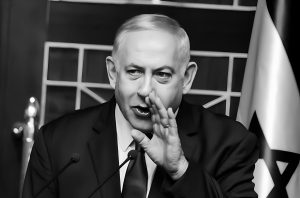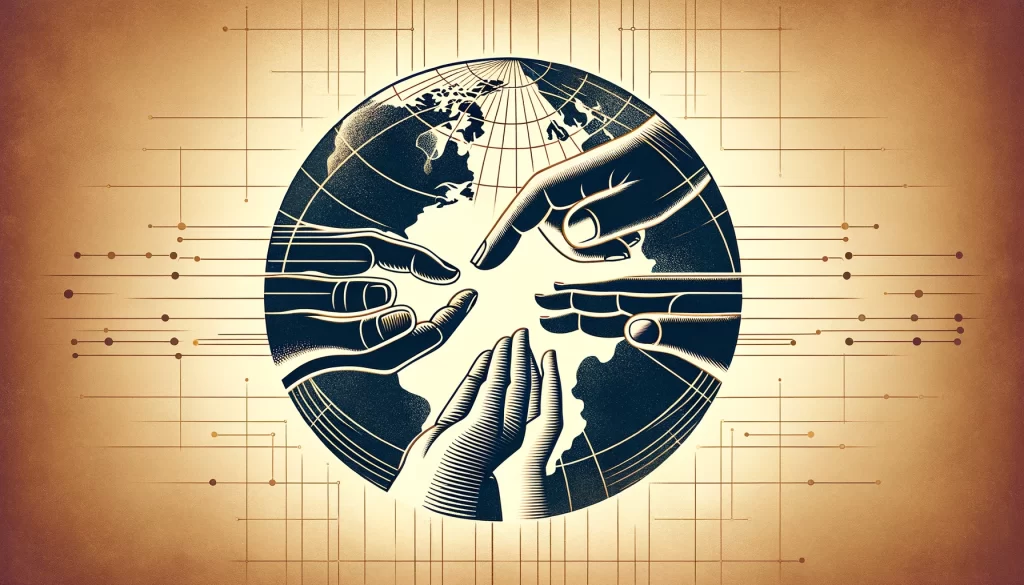
In the ever-evolving landscape of IR, the discourse has predominantly been shaped by state-centric narratives, often overlooking the fundamental human element that lies at the core of all political and diplomatic engagements.
MARCH 08, 2024

There have been calls for a more human-centered approach to international relations for years. Humble visionaries and futuristic leaders advise that senior officers should take their minds off complex geopolitical maps and turn their attention to everyman. How to achieve this has been hotly debated for years without any convincing consensus. In fact, beyond that, the feasibility of this vision is also questioned. Theoretical whispers always sound exciting, but realists are the ones who wake us up from our dreams. Armies, military threats and “secret agendas” planned behind closed doors are often associated with the field. In fact, all these features are directly identified with the field. We might argue that it seems to be “inherent” in the field (of course, it is questionable whether it actually exists). With each passing day, IR ceases to be a club of serious white men in suits, yet we are still taking baby steps in this regard. How will we achieve a more humane IR, all while insisting on continuing to take the state into account as a key actor?
This could be a good question to start with. Firstly, regardless of what the unit of analysis may be, IR is not a domain isolated from the human element, there is no doubt about it. The fundamental unit of analysis is states, and the primary actors are generally considered to be states (depending on your theoretical lens), but at the end of the day, states are structures created by humans and directed by humans. However, things are not as simple as that. States have governance cultures that extend back to before the current leaders, and often, they inherit these from their predecessors. Particularly in foreign policy, it is the area where leaders are most reluctant to take initiatives and is among the most crystallized units of governance. Yet, this does not mean that a state’s foreign policy trajectory won’t deviate; the main policy lines can shift (just as in Türkiye, from red to green), but such shifts are usually experienced not as sudden maneuvers but rather as much more gradual or crisis-specific reflexes.
The reason for this is not the cowardice of makeshift revolutionary or reckless leaders. Of course, there can be many reasons behind it. For instance, those who seek to create changes in policy encounter resistance from the status quo (veto actors). Especially, decision-making cadres in states share a common culture in foreign policy and are bred within the culture of the status quo. Therefore, they hold power, and parties coming into power cannot accumulate enough power to create radical change. Another example is inherent to the nature of international relations. The consequences of actions in the intrastate arena are much less predictable and controllable than according to domestic politics. This is the league of nations, and it’s no joke. It’s a plane where the largest administrative structures on Earth engage with each other. We’re talking about entities managed by massive budgets, covering vast territories, and whose existence is almost ex natura for most people’s imaginations.
Perhaps it’s these sublime and grand characteristics that make it difficult for us to imagine interstate relations as mortal beings. When I say ‘imagine,’ I don’t mean not understanding interstate relations (though I could argue that playing devil’s advocate, but let’s keep it light for now). What we must always keep in mind is that those involved in international relations are humans. Humans have cognitive limitations, biases, emotions, and, of course, they’re mostly not rational. This could be read through political psychology or various macro theoretical perspectives (like rational choice and its counterparts). Another topic that could be discussed is how objects affected by actors’ decisions (i.e., normal people) can develop new attitudes. Sometimes, we are directly or indirectly affected by decisions made on the international stage. But one thing we’re sure of is that our coefficient of being influenced is much higher than our coefficient of influencing.
As ordinary individuals, while trying to make ends meet in a capitalist system and experience our lives at a satisfying level of enjoyment, (1) we cannot be knowledgeable about the international agenda because we don’t have time for it, (2) even if we were informed, we don’t have enough time to act; we work long hours, (3) the street or the so-called new street, social media, is not safe enough, (4) and most importantly, we tend to underestimate our own influence. That’s why in the 21st century, in an age where we think we have progressed significantly as a civilization, we continue to be subjected to inhumane, primitive, high-level, and long-term state violence. This automatically raises the question: is the international system truly anarchic? Why is nobody intervening? Are we as individuals so powerless against and within the system? Or, as a more functional question, how powerless are we really? How will we integrate the modern individual into the international relations system while preserving a humanistic approach and without reducing them to a mechanical instrument?
In answering this question, we will not engage in a debate about the nature of the international system because such discussions do not seem to bring us closer to the subject position we are trying to establish. There can be fruitful debates about what states, leaders, the system, institutions, or international law are. However, all of these are secondary units of analysis with which we engage as subjects. Therefore, every inquiry into the nature of these structures, while it may take us closer to the “essence or truth”, will complicate categorical distinctions because it will reveal the connections between subject-secondary structures. Because at the end of the day, without all the parts, it is dysfunctional, but diagnosing the interdependence of parts and the whole does not make our job easier within this discussion. What we need is to realize the double standards inherent in the system we are born into.
The fact that our power of influence (our subjectivity) is narrower than our power of being influenced (exposure as an object) is an example of this. It is very valuable for us as subjects to be aware of this asymmetry between us and the system. Instead of eliminating the categorical distinction imposed on us through essential inquiries, we can make these distinctions even more pronounced as a brand new strategy. This is a reverse attitude and does not follow a naive or a hidden-state-centric path such as trying to distill the human element within states. On the contrary, it prevents humans from seeing their own reflection in the water. In other words, it does not allow humans to see themselves as part of a larger formation. Of course, this isolates reality and consciously ignores relationships in many ways. Could capitalist market constraints, individualism, and the narrowing opportunities for political action provide other avenues for us to raise our voices?
Is it possible to advocate for rights by taking on all secondary structures with extreme individualism and refusing to engage with them? I don’t know the answers to these questions; what I’m trying to do in this text is to reflect on the inhumane intervention that has been ongoing in Palestine for months. It has been very rare for me to feel so limited in my power as an individual. This does not mean that I always feel powerless, but it motivates me to think about how we as individuals can position ourselves as decision-makers in IR. Direct representation in multinational organizations, striving to include minds not strictly shaped by diplomatic culture in important positions, and rescuing individual discourse from the diplomatic package can put an end to condemnation messages on news channels.
A curated seletion of FA’s must-read stories.
Written By: SHAGNIK BARMAN
Written By: BERK TUTTUP
Written By: ABBY L’BERT
Written By: BILLY AGWANDA
Written By: HIRA SARWAR
Written By: BATUHAN GUNES
Written By: LEON REED
Written By: DARSHAN GAJJAR

E. Erden recently completed her studies at Bogazici University, yet she remains filled with a passion for research and writing.
Written By: GABRIEL RAMIREZ
Written By: DILARA SAHIN
Written By: DILRUBA YILMAZ
Written By: NILAY CELIK
Written By: ELDANIZ GUSSEINOV
Written By: JOSEF SCHOEFL
Written By: SELCAN BEDIRHANOGLU
Written By: FATIH CEYLAN
FA’s flagship evening newsletter guilding you through the most important world streis ofthe day. Delivered weekdays.